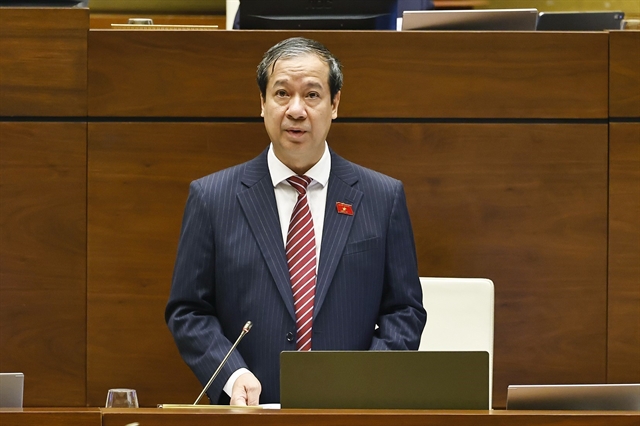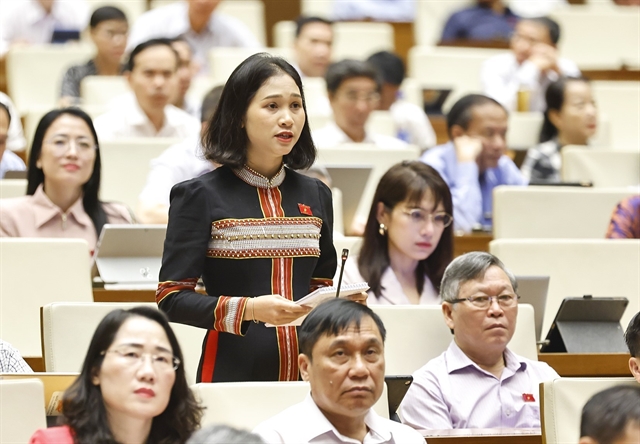 Politics & Law
Politics & Law


|
| Minister of Education and Training Nguyễn Kim Sơn responds to questions from National Assembly deputies. — VNA/VNS Photo Doãn Tấn. |
HÀ NỘI — During a National Assembly (NA) question-and-answer session on Friday, Minister of Education and Training Nguyễn Kim Sơn came under scrutiny as NA deputies raised concerns about ongoing school violence, the rise of online bullying and food safety in schools.
Deputy Nguyễn Minh Tâm of Quảng Bình Province began the session by raising concerns about the ongoing issue of school violence, particularly the rise in cyberbullying, which she noted had become increasingly alarming since 2023.
She said that despite efforts by the Ministry of Education and Training (MoET), school violence remained widespread and continued to harm students' mental health and development.
The deputy asked the minister to outline specific measures being taken, provide a timeline for ending school violence and explain how schools would be held accountable.
Minister Sơn acknowledged the urgency of addressing school violence, expressing the education sector’s aspiration for schools to become safe and happy spaces free from violence. However, he cautioned that schools could not be viewed in isolation from societal issues.
He said that the boundaries separating schools from the outside world were becoming increasingly blurred, largely due to the influence of the internet, social media and modern communication technologies.
As long as violence continued to exist within society at large, he noted, it would inevitably spill over into the school environment.
“If you ask me when violence will disappear from schools, I would say: the day adults stop hurting each other. That’s the day children will look at one another with only kindness - but it’s still a long way off,” he said.
“What we must do now is reduce, manage and prevent violence in every way we can.”
The minister referred to MoET statistics indicating that around 70 per cent of students who engage in violent behaviour come from unstable family situations, such as parental divorce or exposure to domestic violence, either as witnesses or victims.
He emphasised that such experiences have a profound impact on the students’ psychological development and behaviour.
Family plays a crucial role in shaping values and ethics, he said, added: “While schools continue to increase psychological support and improve moral education, the example set at home is just as important.”

|
| NA deputy from Kon Tum Province, Nàng Xô Vi, poses a question during the session. |
Deputy Nàng Xô Vi from Kon Tum Province voiced particular concern over the increase in psychological violence, especially among students in mountainous and ethnic minority regions. She said the situation is exacerbated by a lack of trained school counsellors, overburdened teachers, and weak collaboration between schools, families and communities.
She called on the ministry to outline a clear roadmap to build safe, inclusive and supportive learning environments, particularly in disadvantaged areas.
In response, Minister Sơn recognised that the nature of school violence varies by region, noting that cases in remote and mountainous areas tend to be less complex than those in urban settings. However, he pointed to the rise of online violence, particularly bullying, noting that it was becoming more common and complex.
He reported that an estimated 20 to 25 per cent of school violence incidents now occur in digital spaces, and called for the education sector to place greater emphasis on addressing this form of abuse.
“This is no longer a peripheral issue, online violence must be at the centre of our school safety strategies,” he said.
Lawmakers also raised concerns over the safety of meals served in schools, particularly in boarding schools and those catering to younger children.
Minister Sơn admitted food safety remains a major concern and said current regulations, largely governed by joint circulars between MoET and the Ministry of Health (MoH), are in need of clarification.
He proposed a clearer division of responsibilities in managing food safety, suggesting that MoH should serve as the lead authority in setting regulations, while MoET would focus on ensuring compliance within schools. He said this approach, based on the principle of one task, one lead agency, would enhance efficiency and clarity in implementation.
Sơn also called for stronger oversight by local authorities, particularly in checking the sources of food supplies. He said his ministry would work more closely with MoH to help local areas carry out more thorough inspections.
The minister said schools must take responsibility for maintaining food safety and said his ministry would increase monitoring of staff involved in meal preparation, ensuring that internal procedures are properly followed to protect students’ health. — VNS




